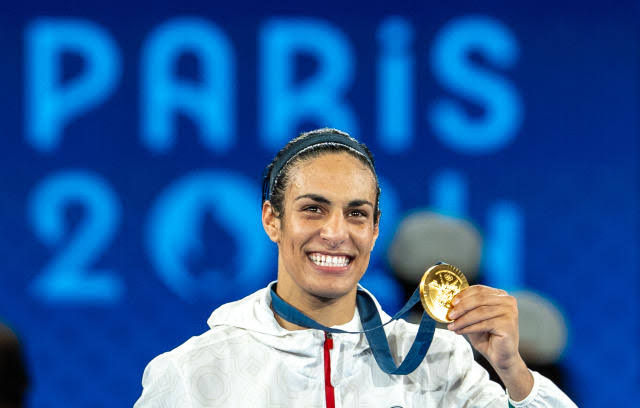In a striking development, Algerian Olympic champion Imane Khelif has filed a criminal complaint with French authorities against several high-profile figures, including J.K. Rowling and Elon Musk, accusing them of aggravated cyber harassment. The complaint was lodged through the anti-online hatred center at the Paris public prosecutor’s office, according to Khelif’s Paris-based attorney, Nabil Boudi.
The lawsuit, which names Rowling and Musk among others, follows Khelif’s gold medal win in the women’s 66-kilogram boxing category at the 2024 Paris Olympics. Despite her triumph, Khelif was at the center of a heated and unfounded controversy regarding her gender eligibility, which led to a barrage of abuse on social media. The International Olympic Committee had firmly supported Khelif, stating, “scientifically, this is not a man fighting a woman,” yet this did little to quell the online vitriol.
The lawsuit, filed under French law against unknown persons, allows for the investigation to encompass all individuals who may have been involved in the cyber harassment, including those who posted under pseudonyms. Boudi emphasized that while the complaint names certain individuals, including Rowling and Musk, the broader aim is for the prosecution to investigate all parties involved.

During the Olympics, J.K. Rowling, who has a history of controversial comments on gender issues, posted a tweet accusing Khelif of being a man and enjoying “the distress of a woman he’s just punched in the head.” Elon Musk, the owner of X (formerly Twitter), also entered the fray by amplifying a post by swimmer Riley Gaines, which claimed, “men don’t belong in women’s sports,” to which Musk added his agreement.
Also, read; The Unsung Heroes: How Nigeria and Other African Nations Supported South Africa During Apartheid
Donald Trump also joined the chorus, posting a picture from Khelif’s fight with Italian boxer Angela Carini, along with a message vowing to “keep men out of women’s sports.” Meanwhile, Logan Paul, another high-profile figure, tweeted that Khelif’s victory was “the purest form of evil” and suggested that a man was allowed to beat a woman on a global stage. Although Paul later deleted his post and admitted to possibly spreading misinformation, the damage had been done.
Boudi clarified that while the complaint is primarily aimed at the authors of the defamatory social media posts, it is not directed at the platforms themselves. However, he noted that judicial authorities are increasingly taking cyber harassment cases seriously, with potential for prison sentences in some cases.

The impact of the harassment on Khelif was profound, according to her coach, Pedro Diaz. He described the cyberbullying as a “crazy storm” that deeply affected Khelif and her team. Diaz, a seasoned coach with 21 Olympic champions under his belt, said the experience was unlike anything he had ever witnessed, calling it “disgusting.”
To protect Khelif’s focus, Diaz advised her to avoid social media during the competition. Despite the overwhelming negativity, Khelif’s determination led her to victory, which Diaz described as the most rewarding win of his coaching career.
As the investigation unfolds, it remains to be seen how the French legal system will address the complex issues of cyber harassment involving prominent international figures. For Khelif, however, the lawsuit represents a fight for justice and a stand against the online abuse that overshadowed her moment of triumph.

